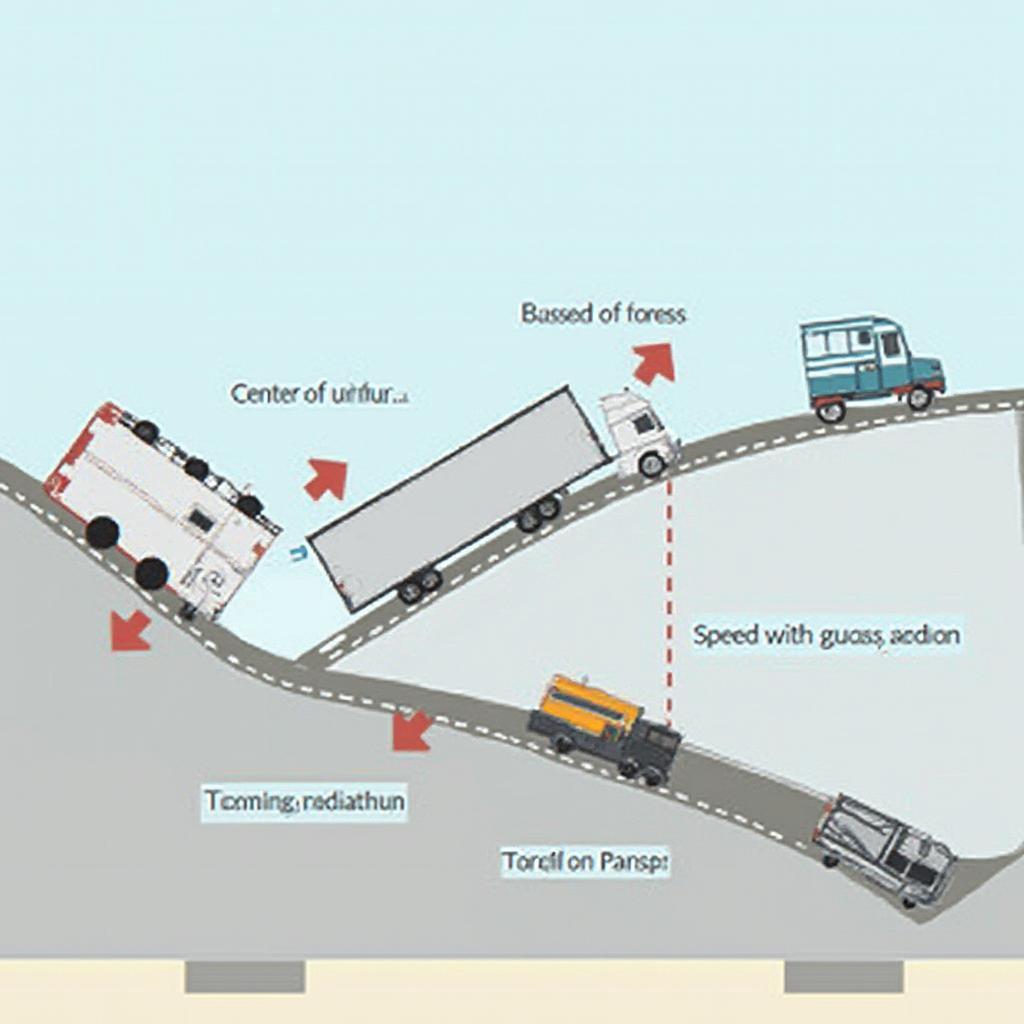Your cart is currently empty!

Preventing Car Tip Over: Essential Safety Tips
Car Tip Over is a serious safety concern that can lead to severe injuries or even fatalities. Understanding the factors that contribute to rollovers and taking preventative measures can significantly reduce your risk. This article explores the dynamics of car tip overs, offering practical advice and expert insights to help you stay safe on the road. Learn how to assess your vehicle’s stability, adapt your driving habits, and react effectively in emergency situations to minimize the chances of a rollover.
Vehicle stability is a crucial factor in preventing car tip overs. A higher center of gravity makes a vehicle more susceptible to rollovers, especially during sharp turns or sudden maneuvers. SUVs, vans, and trucks are generally more prone to tipping than lower-profile cars. Understanding your vehicle’s center of gravity and its limitations is the first step towards safer driving. Regular vehicle maintenance, including tire pressure checks and suspension inspections, can also enhance stability and reduce the risk of a car tip over. For example, underinflated tires can compromise handling and increase the likelihood of losing control, particularly in challenging driving conditions. You can find more information on car care at covermate boat cover care tips.
Understanding Car Tip Over Dynamics
Several factors contribute to car tip overs, including vehicle design, driving habits, and road conditions. High speeds, sharp turns, and sudden lane changes can shift the vehicle’s center of gravity, increasing the risk of a rollover. Overloaded vehicles are also more susceptible to tipping, as the added weight further raises the center of gravity. Adverse weather conditions, such as icy roads or strong winds, can further exacerbate the risk. Recognizing these factors and adapting your driving accordingly is essential for preventing car tip overs. Remember, safe driving practices are your best defense against such incidents.
 Car Tip Over Dynamics Illustration
Car Tip Over Dynamics Illustration
Driving defensively plays a vital role in preventing car tip overs. Maintaining a safe following distance allows for ample reaction time in unexpected situations. Avoiding distractions, such as cell phone use or eating while driving, allows for full concentration on the road and potential hazards. Smooth and controlled steering inputs are essential, especially when navigating curves or changing lanes. By adhering to these defensive driving principles, you can significantly reduce your risk of a car tip over.
How to React in a Potential Tip Over Situation
Despite preventative measures, sometimes emergencies arise. If you feel your vehicle starting to tip, try to remain calm and avoid sudden braking or steering inputs. Instead, ease off the accelerator and gently steer in the direction of the skid. Once the vehicle stabilizes, gradually bring it to a stop in a safe location. If a rollover is unavoidable, brace yourself for impact by gripping the steering wheel and protecting your head. For more information on emergency situations, check out philadelphia car tip over.
Vehicle Maintenance and Car Tip Over Prevention
Regular vehicle maintenance is crucial for preventing car tip overs. Ensure your tires are properly inflated and have sufficient tread depth for optimal grip and stability. Have your suspension system inspected regularly by a qualified mechanic to address any potential issues. A well-maintained vehicle is less likely to experience handling problems that could contribute to a rollover. You can also learn more about car maintenance at can a car tip over on jack stands.
“Regular maintenance is like an insurance policy against car tip overs,” says automotive expert, Dr. James Peterson, “It’s a proactive step that significantly reduces your risk and ensures a safer driving experience.”
Conclusion
Car tip over is a serious risk, but by understanding the contributing factors and adopting safe driving practices, you can significantly reduce your chances of experiencing one. Regular vehicle maintenance, defensive driving techniques, and knowing how to react in emergency situations are key to staying safe on the road. Remember, a proactive approach to safety can make all the difference. For those dealing with stress and needing helpful tips, check out self care tips for those who overwork.
FAQ
- What types of vehicles are most prone to car tip overs?
- How does speed affect the risk of a car tip over?
- What should I do if my car starts to tip?
- How can regular maintenance help prevent car tip overs?
- What are some common driving mistakes that increase the risk of a rollover?
- Are there any specific safety features that can help prevent Car Tip overs?
- How can I assess my vehicle’s stability?
Do you have other questions about vehicle maintenance or car safety? Check out our other helpful articles like 3 self care tips from kristen neff.
Need assistance? Contact us via WhatsApp: +1(641)206-8880, Email: [email protected]. Our customer service team is available 24/7.

Leave a Reply